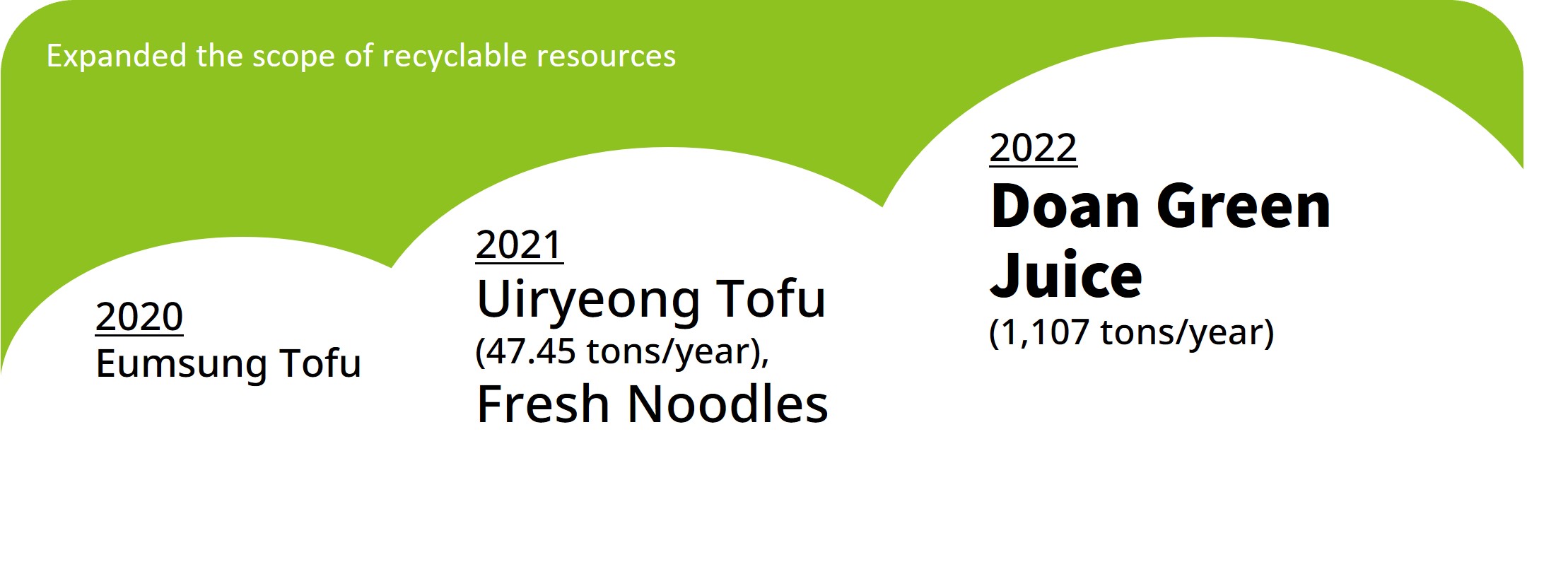Food loss & waste
Food Loss & Waste Management
■ Food Loss Management Policy
Pulmuone has established the ESH Management System Manual to manage the history of food loss and waste, set and implement reduction targets, manage food loss and waste throughout the product life cycle, and collaborate with upstream and downstream partners.
Key Policy Features:
- Pulmuone manages the history of waste generation and sets goals to reduce it, with a particular focus on strict internal standards for food loss and waste.
- Pulmuone measures and manages the amount of loss and waste based on the product life cycle of each food group and sets reduction targets for management.
- Pulmuone actively promotes the recycling of food loss and waste and shares relevant programs with partners to create a sustainable industry ecosystem.
■ Food Loss and Waste Management System
Pulmuone manages all waste through the Albaro system, the Waste Legal Processing System provided by the Ministry of Environment. Through this system, Pulmuone measures and manages the total amount of food loss and waste generated, disposed, etc. Additionally, Pulmuone manages inventory levels and monitors the expiration date of remaining stock in stages after food production, minimizing the generation of food waste at the source through monitoring and promotion of proper inventory management and facilitating sales.
■ Programs
Reduction of Food Loss & Waste Disposal
To minimize the environmental impact caused by food loss & waste generation, Pulmuone applies strict waste separation principles at all facilities and designates specialized outsourced companies to handle food loss & waste in a systematic manner. Additionally, Pulmuone has reduced waste generation by recognizing byproducts such as soybean pulp and noodle scraps, generated during the production of tofu and noodles, as recyclable resources for reuse instead of waste. In particular, Pulmuone has made significant efforts to reduce plant-based residues, a major type of waste, and has received recognition as a recyclable resource from the Ministry of Environment, resulting in a significant reduction in total waste disposal. Pulmuone also promotes a circular economy by reusing resources through processes such as using them as animal feed. As of 2022, Pulmuone has received recognition of plant-based residues as recyclable resources at its four manufacturing facilities. Furthermore, Pulmuone is working towards expanding this recognition to other facilities. Additionally, Pulmuone has introduced and operates microbial treatment systems to reduce food waste generated during the manufacturing process.
[Key Performance]

Food waste for alternative uses
Pulmuone utilizes various methods to recycle recyclable food waste generated during the manufacturing process and has been recognized as a "recyclable resource" through the circular resource recognition system. As a comprehensive food company, Pulmuone is actively pursuing the reduction of plant-based residues, a major type of waste generated at its facilities, and has received recognition as a recyclable resource from the Ministry of Environment. Pulmuone is expanding the recognition under the circular resource recognition system, starting with Pulmuone Food Co., Ltd.'s Eumseong tofu factory in 2020 and Pulmuone Green Juice's Doan factory in 2022. Additionally, Pulmuone is carrying out the Zero Food Waste activity at its Uiryeong tofu facility.
Reduction of Food Waste through Supplier Collaboration
Product defects, such as deviations from standard specifications and packaging defects, can lead to food damage and disposal, contributing to the generation of food waste. Pulmuone is actively reducing food loss and waste by collaborating with suppliers in joint R&D activities to improve product quality. For example, through joint R&D with partner companies, Pulmuone identifies and addresses the causes of defects and implements measures such as the introduction of new facilities to reduce product defects and, consequently, food waste..
[Food loss & waste*]

*Source: data about vegetable remnants, animal remnants, food wastes, waste cooking oil, sludge from Allbaro system (national waste database)
*Food Loss and Waste Intensity: Based on total food production volume
[Food Loss&Waste volumes by food category]

-
- 이전글
- 이전글이 없습니다.
-
- 다음글
- 다음글이 없습니다.









